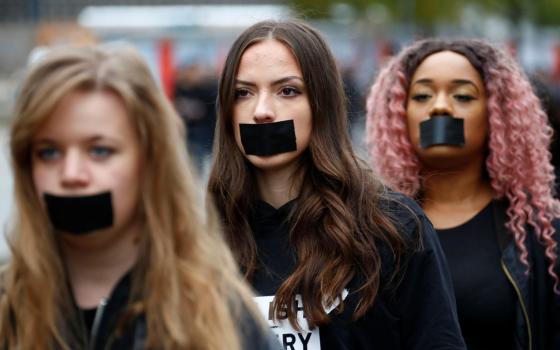Editor's note: Global Sisters Report is focusing on the efforts of sisters to end human trafficking as Talitha Kum, the international anti-trafficking network of religious, marks its 10th anniversary and launches its Nuns Healing Hearts campaign. The special series will run periodically through September, when Talitha Kum will hold its first general assembly. Since its founding in 2014, GSR has dedicated a section of its coverage to sisters who in various ways fight human trafficking. Read all of our coverage.
For the past five years I have participated in and been part of the United Nations' Commission on the Status of Women meetings, held annually —for 63 years — at the U.N. Each year, I am inspired by the women who come from all over the world to tell their stores, relate what they are doing to stop the violence toward women, and share their struggles to insure that finally, women will be considered as equal to men.
Are we going forward in this struggle? Is it getting better for women? Unfortunately, it seems to me that the painful and sad cases of violations — especially relating to domestic violence and the commercial sale of women and children for sex — are worsening. In these cases, men are the main violators, but women can be involved and can profit, especially in the gigantic, horrid business of human trafficking.
When the stories are told of sexual violations, very few men are involved in this dialogue, though they may be present in discussions at the Commission on the Status of Women, or CSW, and in other venues. While women's stories can give hope, as survivors become activists, the continued magnitude and scope of the violence around the world is depressing, and calls for much greater participation by the gender that is providing the demand.
One session I attended at CSW63 was titled "Exploited Indigenous Women in North America." Survivors (now activists) from one of the more than 500 native tribes in the U.S. said that sexual exploitation and prostitution have been deeply embedded since the time when the first European settlers arrived. It just continues. The panelists told stories, some from their own lives, of girls and women being lured, threatened, captured, forced, and sometimes murdered so that sex can be sold.
These survivor activists shared research from their area in Duluth, Minnesota, where there are numerous jobs for male workers: on ships and in industrial fields, digging and building, and laying pipes. The corporations that have hired those male workers bring women in trucks, to be bought for sex. Big industry arranges for women from the reservations to be brought to camps where men alone are working. It is just assumed that men need sex in order to survive, and that such a business can make money.
We were told that indigenous women, especially the young, are the most vulnerable due to their poverty and the trauma they have already experienced in their family and community lives. Young indigenous girls are easily led by the lure of becoming a model or of gaining a good job. These women are made available for violation. This is just the way it is. "Prostitution" is seen by girls and women as a way of life for some of them. It is institutionalized.
Contempt for indigenous women is exemplified in the use of the word "squaw." It is not an indigenous word and is not used by Native Americans, but it became a term of derision among European settlers, some of whom used it as equivalent to "whore." Today it is often used in a very racist and sexually abusive way.
Is it possible to change this paradigm? Would it make a difference if we actually believed in the equality of women and men? Is change possible and how can we make it happen?
I believe that many more men need to be part of this dialogue toward change. Unfortunately, not one man was present in that particular session with the indigenous women. There was not one man present in another session I attended, which featured a presentation on how girls and women are being sold and how drugs are involved in that reality. Our world really needs to rethink the topic of what men need. Do men need sex to live? Has any man ever died from a lack of sex?
Now, it's pretty clear that not all men buy sex. Not long ago, I had a conversation with a male psychologist, a man in my parish, who said that men feel threatened by such a conversation, even if they themselves do not buy sex.
So how do we get more men involved in this discussion? What do parents tell their sons about sex and prostitution (buying sex)? How do we approach this kind of conversation with the boys and men in our lives? How do we invite men to hear the same stories and attend the workshops we women do? How do we do so without their feeling threatened by the question? How do we just engage this issue in conversation, in family, in church and in school?
So much transformation needs to take place! I promise to engage one male relative in these questions in the coming months. I am also interested in finding out what other people — male and female — think about the questions I raised, and what they are doing about them. Perhaps I will arrange a discussion session at the next Commission on the Status of Women.
[Kathleen Kanet is a sister of the Religious of the Sacred Heart of Mary who has worked as a teacher and administrator in an elementary school and as caseworker and supervisor in a preventative service program for preservation of families. She has co-founded several national and international organizations which promote peace and has been involved in multiple educational activities around the issues of peace and justice.]

